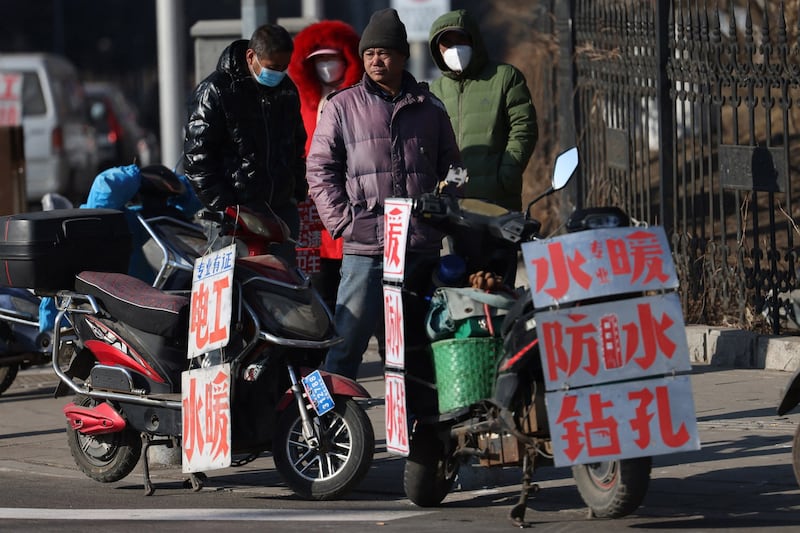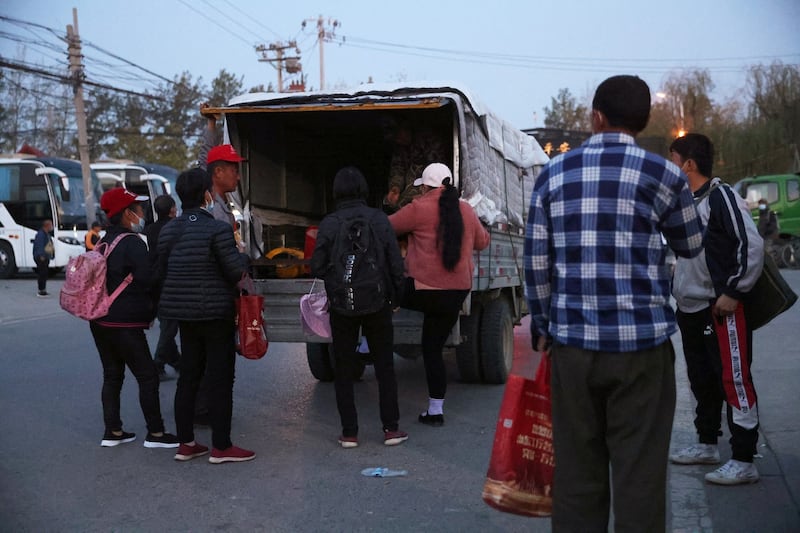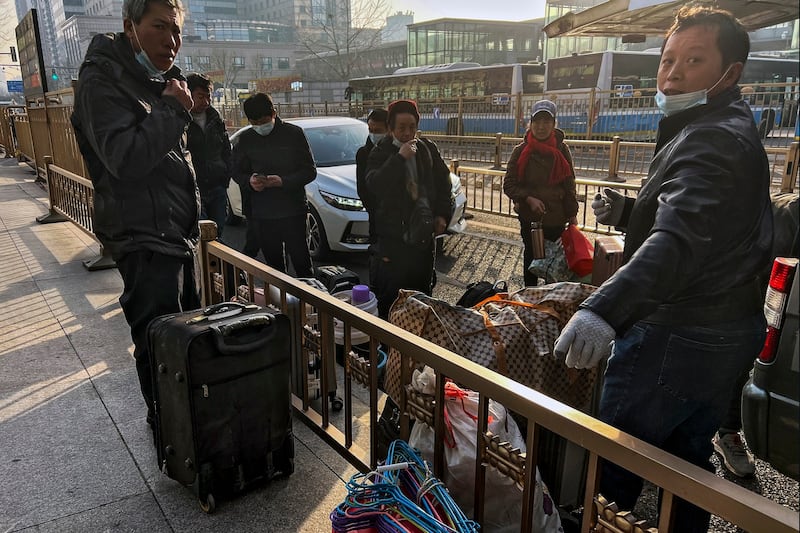Despite the atmosphere of prosperity, optimism and celebration running through state broadcaster CCTV’s Lunar New Year programming, three migrant workers told RFA Mandarin that their economic prospects look bleak going into the Year of the Dragon, citing closing factories, unpaid wages and a general lack of confidence.
“Yezi Nong”: struggles just to get paid
It’s the first day of the Year of the Dragon, and 29-year-old crane operator Yezi Nong has just gotten paid. One paycheck only landed after crane-workers staged a half-day strike ahead of the Lunar New Year festivities.
The other came through at the last minute from a job in Shanghai that lasted a couple of months and netted Yezi, who asked to be identified by a pseudonym for fear of reprisals, around 12,000 yuan
But Yezi isn’t happy. Work is scarce in the economic downturn, and China’s migrant workers are increasingly having to protest, strike and even fight for the wages they do earn.
“Why do they do this? I don’t think they have wage arrears in Hong Kong and Macau,” he said. “It’s infuriating – I can’t even afford to eat any more.”
Unpaid wages are currently the leading cause of industrial disputes across China, according to the Hong Kong-based China Labour Bulletin.
Yezi, who has previously worked in Shanghai, Beijing and Guangzhou, is now unwilling to look for work in such expensive cities.
“Living in Guangzhou means paying for stuff every day, which I can’t afford,” Yezi said. “I daren’t just travel around without a care any more – every move I make costs money.”

Yezi is hoping that a friend of his in Hong Kong can get him work there.
“Things aren’t up to standard [here],” he said. “They won’t pay you. Every year, there are migrant workers demanding their wages. It’s not like that in Hong Kong and Macau.”
“Must Make More Money”: help me and my family get out of China
“Must Make More Money” has been taking casual work wherever he can find it over the past few years. His wife works in a trading company.
He and his family of five get by on much less now, he told RFA Mandarin, and he worries about the future given the current economic and political situation over the past couple of years.
"Factories are shutting down, the real estate sector is struggling, and the population is in decline," he said. "You can see it in the industrial zones and shops that have closed."
Ideally, he would like to join the "run" movement of people seeking new lives outside of China, and hopes that he will get help to do that as a result of giving an interview to foreign media.
“I hope someone can help me to leave China, preferably with my family,” he said.
And it’s not just about the money.

“Must Make More Money” has a five-year-old daughter in kindergarten and has been forced to live apart from his wife, who has gone back to their rural hometown to guard the family’s forested land, which is under threat from illegal mining activities.
“This country is rotten to the core,” he said. “My kid is having to study Xi Jinping Thought in kindergarten – do American kids have to study Biden’s thoughts?”
“Our mountain forest was illegally mined, and there is no way to protect it,” he said. “We have reported it to various government departments to no avail.”
“We keep reporting it to the anti-corruption bureau, but nothing has come of it.”
He said Americans would be more likely to defend their land with guns.
“Living in China is oppression,” he said. “There’s no rule of law, no freedom and no human rights.”
“Mr Lin”: The working class should be more revolutionary
A college-educated former white-collar worker in finance, “Mr. Lin” isn’t a typical migrant worker. He has been working odd jobs over the past three years, after quitting the financial sector in 2018.
He says he no longer believes in social mobility.
“Some of my colleagues used to believe that if they could pay off their mortgage by the age of 45, and buy a shop in the provincial capital nearest their hometown, they could have a good life in just a few years living off the rent,” he said. “But if that asset depreciates, or rents fall, then those years of struggle don’t seem worth it any more.”
“What if you can’t rent out [your property] if the economy takes a turn for the worse?”
Lin recently returned to his home in a rural part of Shandong to spend Lunar New Year with his elderly parents.
“I’ve come back here just to eat the [New Year’s Eve] meal and stay a few days, so the other relatives don’t talk about me,” he said.
Lin, who has also run into problems getting employers to pay his wages, said the experience has made him more of a socialist, and feel that China needs political reform.
“I think we should be promoting the idea of political reform -- we should advocate ideas that go beyond what is currently acceptable,” he said. “We shouldn’t be like social democratic parties in Europe: civilized but not revolutionary enough.”
He said China’s “socialism with Chinese characteristics” consists of sacrificing the rights of the majority in favor of those who can accumulate capital.
“That’s back to front,” he said.

He’s not short of money, having made a nest egg from investing in the stock market. But Lin refuses to invest his savings in any kind of business.
“There’s no way I can start a business,” he said. “I am pessimistic about the economy.”
“Confidence is worth more than gold and currency,” he said, citing falling investment, rising unemployment and widespread delays in year-end bonuses this year.
China’s population fell by 2 million people last year, fueled by long-term decline in birth rates and a wave of deaths from COVID-19, as the country reported slower-than-expected economic growth in the fourth quarter despite government claims of a post-lockdown recovery.
Economic expansion of 5.2% from October through December achieved the government's official target, but prospects for short-term growth remain hampered by a burst real estate bubble, weak consumer and business confidence and mounting local government debt.
In January 2024, China’s Consumer Price Index fell by 0.8% year-on-year, marking the fourth consecutive month of deflation. China’s Manufacturing Purchasing Managers’ Index (PMI) was 49.2, also marking the fourth consecutive month below the 50 threshold, indicating a contracting economy.
Lin partly blames the “petit bourgeois ideas” of entrepreneurs and workers in the decades following the economic reforms kicked off by late supreme Chinese Communist Party leader Deng Xiaoping in 1979.
“They were free, but not independent members of the proletariat,” he said.
Translated by Luisetta Mudie .
